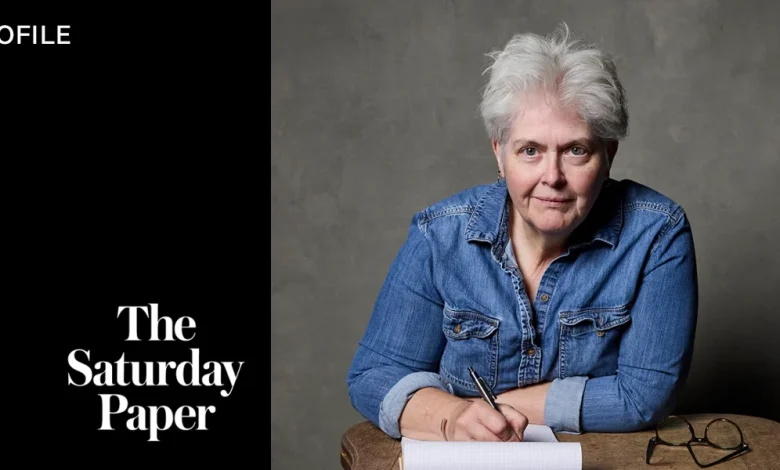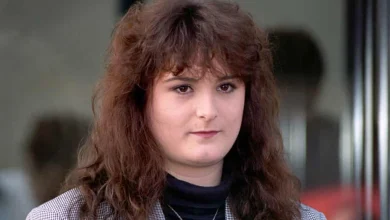TV writer Sally Wainwright creates characters that command attention

Forthright, focused and friendly, in person Sally Wainwright is exactly who you might expect her to be from her distinctive work in television over the past three decades. The unassuming, independently minded English writer, producer and director set out early in her career to resist being pigeonholed and has since made her mark in a range of genres: cop shows, domestic comedy-dramas, soaps and period romps.
Since she’s been able to create her own series, most have focused on female characters. Perhaps the best known is Happy Valley (2014-23), a crime drama acclaimed as one of the finest television series ever made. It’s gathered a disparate array of fans: Bob Dylan is reportedly an admirer, Lena Dunham and Guillermo del Toro tweeted their appreciation and Australian producer Bruna Papandrea declared it her favourite show of all time.
Ironically titled, it follows the professional and private life of tough, troubled West Yorkshire police sergeant Catherine Cawood (Sarah Lancashire), a divorced wife, grieving mother and conflicted grandmother. James Norton, who plays the series’ chilling villain, has a persuasive explanation for its global resonance. “Sally writes brilliant thriller plots, nailbiting stuff, cliffhangers. People want to know what happens next and come back for it every week,” he says. “But what really drives Happy Valley are the characters, the family, the relationships between those characters; it’s blood, really. That’s why it’s universally appealing, because everyone knows what it is to have a complicated family.”
In an illuminating illustration of how Wainwright learnt to trust her own judgement, she waited seven years between the show’s multi-award-winning second season and its third to allow time for Rhys Connah, the actor playing Catherine’s grandson, to age in real time so that she wouldn’t have to recast the role. The protracted delay between seasons of a hit series suggests a creative force with confidence in her decisions and in her audience, as well as one with enough clout to do things her own way. Still, it was a gamble and it took guts: television is a hungry beast perpetually hunting for hits, and when something fires, the appetite for fast follow-ups is voracious. Wainwright’s instinct to wait paid off handsomely.
Even though the softly spoken Wainwright describes herself as shy and says in her early days she was so intimidated in writers’ rooms that she didn’t speak, she conveys a discernible steeliness, a definite don’t-mess-with-me quality. She’s also generous – as a guest of the Future Vision summit at Melbourne’s ACMI, she enthused about Deadloch, the Tasmania-based crime comedy created by Kate McCartney and Kate McLennan, as “one of my favourite shows ever”.
“I love the humour,” she tells me. “It’s shot with such sincerity: the music is so sincere and Kate Box’s performance is so sincere. Then there’s everything around her: she’s like a centre of sanity in a mad, mad world. The storylines are so detailed and thorough that I was hooked in the way that I hope to be with a good thriller. But it’s hilarious at the same time. That’s what I aspire to write: I aspire to be as dark as I am funny. And they nailed it with knobs on.”
Wainwright’s clarity and confidence in her work is evident in her dismissive shrug in response to some unfavourable reviews. “They’re just wrong,” she says. “The way they write about what you’ve written, they just didn’t get it.” Which is not to say she’s not open to constructive criticism. “Writing is personal, so when people come along with notes, they better be fucking good notes. You need to work with people you trust, so if a note keeps coming up, you should consider it.”
Born in Yorkshire, Wainwright moved to London after university in York and trained as a bus driver, thinking the job would leave her mind free to read and write. Her early work came with scripts for radio serial The Archers, before she moved on to Coronation Street. There she met Lancashire, a welcoming cast member who would become a regular collaborator, as did other actors Wainwright has worked with, including Suranne Jones, Amelia Bullmore and Anne Reid.
She looks back on her time at the soaps as valuable, teaching her the discipline and skill required to write propulsive stories for limited numbers of characters operating in a prescribed range of settings. “It was a huge learning curve,” she says. “I was there for three years and I was terrified.”
While working on Coronation Street, Wainwright was mentored by Kay Mellor, who encouraged her to generate her own projects. It led to her first original pitch, At Home with the Braithwaites (2000-03). The tale of “a very ordinary family”, it follows what happens after they win the lottery and matriarch Alison (Amanda Redman) decides to not share news of the jackpot with her husband and children. The four-season series introduces a pattern identifiable through Wainwright’s work: it’s set in Leeds, a part of the world she knows well, and focuses on a family.
“Writing is personal, so when people come along with notes, they better be fucking good notes.”
She went on to Children’s Ward, co-created by Mellor and Paul Abbott, a hospital drama that was a key stepping stone for a number of future showrunners, including Mellor (Band of Gold), Abbott (State of Play, Shameless) and Russell T. Davies (Queer as Folk, Doctor Who, It’s a Sin). Mellor subsequently joked, “Somebody said to me, ‘You were responsible for Sally Wainwright speaking out. Now she doesn’t shut up!’ ”
A conversation with Abbott during that time proved pivotal. “We were talking about having a go at writing all sorts of bits and pieces and about avoiding police drama, because as soon as you write police drama, you get pigeonholed,” Wainwright recalls. “So I was quite nervous when I started writing Scott & Bailey (2011-16). I didn’t want to get pigeonholed as a police writer. I did a huge amount of research and wanted to find a new angle on how to do a police drama, because the public does like police shows. We wanted to do something you’d never seen before, which I think we did, because it was all about the interviews and how it’s a team effort. It’s not eccentric Mr Morse and one brilliant sidekick driving a whacky car.”
It was followed by a three-part crime drama Unforgiven (2009), about a woman (Jones) who returns to her home town after serving time in prison for murdering two police officers. Wainwright wanted to direct some episodes because it bothered her when her words were translated to the screen in ways that she didn’t appreciate. ITV refused her request because she didn’t have directorial experience.
She shifted away from crime for Last Tango in Halifax (2012-20), a domestic drama inspired by her mother’s life. She notes wryly that her mum was keen on the casting of British theatre luminary Derek Jacobi as one half of the couple who rekindle a teenage romance when they’re in their 70s. Wainwright Sr was less enthusiastic about Anne Reid playing Celia, the character inspired by her, and was also no fan of Lancashire, who played one of their daughters.
Lancashire’s next performance for Wainwright produced one of television’s great female characters in Catherine Cawood and gave Wainwright her directing debut. Happy Valley grew in part from Wainwright’s idea of revisiting the pioneering early ’80s police series Juliet Bravo, about the challenges confronting a female police officer. She wrote it for Lancashire, explaining that she finds writing for particular actors rewarding. “You’ve got their voice in your head,” she says. “I find it quite inspiring.”
That might be part of the reason she now has projects in development with Norton, Lancashire and Rosalie Craig, who delivers an electric performance in Wainwright’s latest series, Riot Women, which finished post-production in July.
Norton says actors enjoy working with Wainwright because “Sally likes to keep her teams and the people she trusts close. Once you’re in the club, it’s a lovely place to be.”
“She writes how people speak, which sounds really obvious, but it’s not,” he says. “Writers so seldom are actually able to capture dialogue in its truest form and capture on a bigger scale what it is to be human but also the essence of a moment between two people. With very few words, Sally manages it.”
Further magnets for actors are the multidimensional characters and skilful blending of darkness and light, that mix of comedy and drama Wainwright appreciated in Deadloch. It’s a tricky balance achieved with customary proficiency in the six-part Riot Women, whose final three episodes are directed by Australian Amanda Brotchie. Released in Britain in October, it’s yet to secure a local distributor. On the basis of the cast – which includes Joanna Scanlan, Tamsin Greig, Lorraine Ashbourne, Bullmore and Reid – its accomplishment and irresistible energy, and Wainwright’s track record, that’s only a matter of time.
Initially titled Hot Flush, Riot Women grew from Wainwright’s love of the ’70s musical drama series Rock Follies. “I’ve had the idea in my head for about 10 years,” she explains. “I’ve always wanted to write about a female rock band because of Rock Follies, which is my favourite show of all time. The second series was on when I was 13 and it changed my world: it just stunned me. It had a visceral effect. I remember watching the first episode and thinking, ‘Oh, I’m going to do that. I’m going to make television programs.’ ”
The fact that this rock band is middle-aged and menopausal reflects another aspect of Wainwright’s writing. “I wanted it to be about women at that age,” she says. “So menopause is an aspect of their world, but it’s not everything about them. I’ve realised that I tend to write for the age I’m at. My lead characters tend to be a similar age to me. That’s not a conscious decision, I’ve just found that that’s what I’m doing.”
She says she’s always preferred writing about women. “Again, I don’t think it’s a conscious decision,” she says. “You go where your passion is, you go where your heart is, you go where your excitement is. I just find women more interesting than men. I think women are more heroic than men because they have more to deal with, and I think women are more emotionally articulate than men. So it’s easier to write them having difficult times and being articulate about it.”
Despite a CV that testifies to flexibility and accomplishment, not all of Wainwright’s ideas grow into series. “You just never know,” she says. “It’s an odd alchemy, what works and what doesn’t.” She adds that she worked just as hard on shows that didn’t succeed – such as 2007’s Bonkers – as on those that earnt widespread acclaim.
Two recent works have seen her looking back to earlier times. One is based on a real woman – Gentleman Jack (2019-22) – and the other on an imagined one – Renegade Nell (2024). The former follows the lusty history of Anne Lister (Jones), a 19th-century adventurer, entrepreneur and out-and-proud lesbian. The latter is about a resourceful and resilient young woman (Louisa Harland) who becomes a notorious highwaywoman. Wainwright is now researching Queen Elizabeth I.
One idea that didn’t develop past the research stage was about convicted killer Myra Hindley. “I shied away from it in the end because I started to find it a bit too distasteful,” Wainwright says. “One of the reasons I found it hard was because I think you should always present a character as they would present themselves, however bad they are, because even if you are evil, you probably don’t really think you are.
“The first time I realised that was when I was thinking about writing about Hindley. So often in crime dramas, the goodies and the baddies are obvious. But I think that’s children’s television, really: adult television is where it’s grey. In Happy Valley, Catherine can do bad things and the baddies have reasons for behaving as they do.”
Over the decades in which she’s created her own productions, Wainwright’s rich body of work has grown with a variety that resists easy categorisation. But whatever genre she’s turned her attention to, and whatever the time period, her full-blooded characters command and reward attention, in all their messy, complicated humanity.
This article was first published in the print edition of The Saturday Paper on
October 31, 2025 as “Riot woman”.
For almost a decade, The Saturday Paper has published Australia’s leading writers and thinkers.
We have pursued stories that are ignored elsewhere, covering them with sensitivity and depth.
We have done this on refugee policy, on government integrity, on robo-debt, on aged care,
on climate change, on the pandemic.
All our journalism is fiercely independent. It relies on the support of readers.
By subscribing to The Saturday Paper, you are ensuring that we can continue to produce essential,
issue-defining coverage, to dig out stories that take time, to doggedly hold to account
politicians and the political class.
There are very few titles that have the freedom and the space to produce journalism like this.
In a country with a concentration of media ownership unlike anything else in the world,
it is vitally important. Your subscription helps make it possible.
Send this article to a friend for free.
Share this subscriber exclusive article with a friend or family member using share credits.
Used 1 of … credits
use share credits to share this article with friend or family.
You’ve shared all of your credits for this month. They will refresh on November 1. If you would like to share more, you can buy a gift subscription for a friend.
SHARE WITH A FRIEND
? CREDITS REMAIN
SHARE WITH A SUBSCRIBER
UNLIMITED
Loading…



![Azerbaijan’s upgraded credit rating and economic outlook highlighted at London Embassy event [PHOTOS]](https://cdn1.emegypt.net/wp-content/uploads/2025/11/Azerbaijans-upgraded-credit-rating-and-economic-outlook-highlighted-at-London-390x220.webp)
